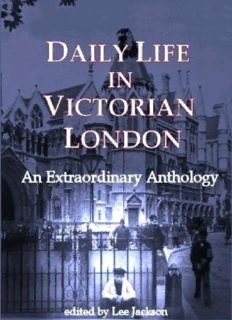
Daily Life in Victorian London: An Extraordinary Anthology PDF
Preview Daily Life in Victorian London: An Extraordinary Anthology
Table of Contents Introduction A Advertising bills [illustration] [advertising boards, vans: Punch, 1850] Advertising boards Advertising vans The Arethusa Training Ship 'At Homes' B A 'B' Meeting A Baby Show A Balloon Ride Bar-Maids [illustration] [Niagara Rocking Bath, advertisement: Pick Me Up, 1891] Bathing Bazaars Bed Bugs Beggars Bicycle Races Billingsgate Market Black Eyes Blackmail The Blind School [illustration] [Bloomerism cartoon: Punch, 1851] Bloomerism [illustration] [Bloomerism cartoon: Punch, 1851] Burglars C Cabs Candles Casual Labour The Can-Can Cars Childhood Discipline Christmas [illustration] [crinoline cartoon: Punch, 1856] Clothing of the 1850s. and 1860s. Coffee Houses The Colosseum Coffee Public-Houses Consumption A Convict Hulk Corsets, offering protection Cremorne Gardens Cross-Dressing The Crystal Palace Curry [illustration] [cycling cartoon: Punch, 1882] Cycling in London D Dancing-Rooms Dancing Bears Department Stores Destitution Detectives Dinner [illustration] [one-legged sweeper: London Labour and the London Poor, 1851] Disability Districts Dockland E An East End Flower Show Electric Light Employment English Cuisine Enon Chapel Etiquette F [illustration] [baked potato man: London Labour and the London Poor, 1851] Fast Food The Field Lane Refuge Flats Flogging Fog Forfeits Freaks Funerals Fur-Pullers Furious Driving G Gambling Clubs [illustration] [early cigarette lighter, advertisement: Pick Me Up, 1891] Gaslight [illustration] [gin palace: Punch, 1860] A Gin Palace Graffiti The Great Wheel Grotto Day Guerilla advertising H Hanging Highbury Barn Hints for Husbands and Wives Homeless Children Hooligans The House Telegraph I Immigrants Importing Ice Industrial Illness J Jacob's Island [illustration] [gory posters: Punch, 1888] The Jack the Ripper Show Jamrach's A Japanese Village A Juvenile Party K Kensal Green Cemetery Knockers Up L Lambeth Floods Laundry [illustration] [crowded lodgings, during Great Exhibition: Punch, 1851] Lodgings London Gin A London House Londoners The Lowther Arcade M [illustration] [servant-mistress relations: Punch, 1853] The Maid of All Work Make-Up Marriage, Pro Forma The Match-Girl The Mesmeric Infirmary Miasma [illustration] [London water: Punch, 1850] A Microscopical Society Midland Grand Hotel Milk Women Mistaken Identity Monday Pops Mourning Mud Larks Music Hall N [illustration] [female convicts, Brixton gaol: Criminal Prisons of London, 1862] Newgate Gaol Night Houses Nuisances A Nursery O The Old Bailey [illustration] [a bus stop: Punch, 1876] Omnibuses Opium Outings P A Packed Lunch Paving Pawnbrokers Pedestrianism Penny Dreadfuls Penny Gaffs Piccadilly Photography Policemen The Polytechnic Pornographic Objects Postal deliveries The Potato Thrower Prams [illustration] ['gay' women, ie. prostitutes: Punch, 1857] Prostitution Privies Public Bathing Public Toilets Q Quackery R Raffles amongst the poor Rail Journeys Ratcliffe Highway Rats Reading Recycling [illustration] [rollerskating: Punch, 1876] Rollerskating Rotten Row, Hyde Park S St. James's Park Samuel Scott, The American Diver Sea Water Baths Secret Vice Seven Dials Shooting Galleries Shopkeepers' Greek Shop Work Slang Slops Smithfield Market [illustration] [ballet girls, smoking: Pick Me Up, 1891] Smoking The Snail Telegraph Snow Somaliland in London Song Writing Spiritualism Spring-Heeled Jack Squirrels [illustration] [street conjurer: London Labour and the London Poor, 1851] Street Acrobats Suburbs Suicide Surrey Zoological Gardens Sweatshops T The Tea-Leafer Telegraphic Paralysis Telegraphists and Telephonists Terrorism The Thames The Thames Tunnel Till-Lifting Toll Gates The Tooley Street Fire Tooth Powder Toys Traffic The Travelling Cad U Underclothing Underground Unwanted Pregnancy V Vitriol Throwing W Warnings to Travellers Wet Nursing Workhouses X X-Ray Z Zuleilah Appendix I - Picture Postcards Appendix II - A Note on Sources Introduction This anthology has one simple goal: to give the reader a flavour of 'how life was lived' in Victorian London, through the words of the Victorians themselves. It is not a comprehensive study; but I have revisited an archive of ten years' reading and research — nineteenth century diaries, newspapers, magazines, memoirs, guidebooks — in an attempt to include as many diverse aspects of Victorian life as possible. There is, I must admit, a certain bias in my choice of material: I concentrate on the poor and middle-class. Queen Victoria is glimpsed at a distance, in Hyde Park; MPs and members of the aristocracy appear as the patrons of charities; but this is a book about the everyday. Some of these excerpts make for rather grim reading: the graphic account of a botched back-street abortion; the plight of homeless children, abandoned by their parents; the fever-ridden slums of Jacob's Island. Crime is also to the fore: attempts at blackmail; the rise of the 'hooligan' in Lambeth; the vicious malice of the 'vitriol thrower'. Likewise, it is impossible to neglect the scourge of prostitution in the capital, albeit with one rare instance of a 'soiled dove' who 'made good'. I have, therefore, included a few gratuitous doses of quirky Victoriana, to leaven the mix: advice on keeping pet squirrels; the invention of the snail telegraph (the supposed power of 'escargotic vibration'); how to make tooth powder (with the obligatory drop of cocaine). I also focus on street life. Hence you will find articles about the giant 'advertising vans' which blocked major thoroughfares; races between rival omnibus companies; the wall painters who engaged in 'guerilla advertising'; the delights of Victorian fast food (sheep's trotters, anyone?). This book, at its best, should provide a vicarious form of time travel. The reader will feel, I hope, that they have walked the streets of Victorian London and, having read the more intimate passages — how to remove bed-bugs; tips on wet-nursing; dire warnings against 'secret vice' — that they have also glimpsed behind closed doors. Some things herein may appear quaint — complaints against the immorality of the 'can-can'; disdain for women practising 'bloomerism' (ie. wearing trousers); the unlikely forfeits demanded by parlour games — but they all throw a revealing light on the distinctive mores of the time. I hope, too, that a few things will surprise and astonish, to the extent that
